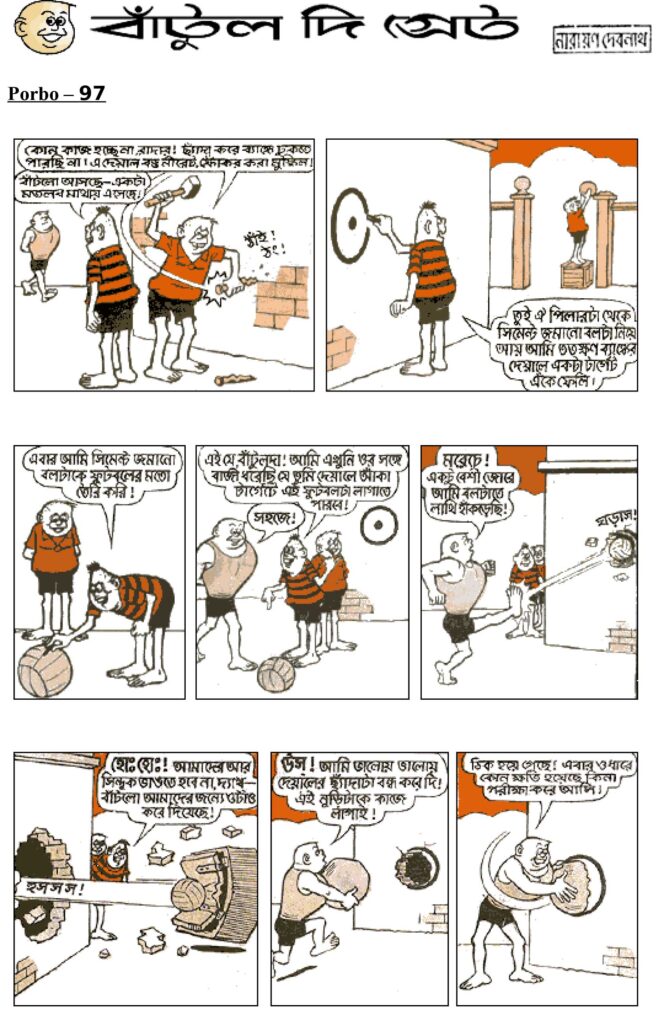Narayan Debnath is a renowned comic artist from India, known for his iconic characters, especially Hada-Bhonda, Bantul the Great, and Nonte-Phonte. These characters have transcended generations and gained immense popularity in West Bengal and beyond. Debnath Babu holds the distinction of being India’s first and only comic artist with a Doctor of Literature degree.
His illustrations and comics have graced numerous newspapers, books, and magazines, notably in Shuktara, Kishor Bharati, and others. Narayan Debnath is often referred to as the father of Bengali comics, and his creations have entertained children with their playful antics and occasional humorous jests.
In 1962, he introduced ‘Hada Bhonda’ in Shuktara, followed by the creation of ‘Bantul the Great’ in 1965. The inception of ‘Nonte Phonte’ took place in Kishor Bharati in 1969.
Among his other cartoon characters, there is also Rabi Chobi, introduced in May 1961 in the Anandamela weekly magazine to celebrate the birth centenary of Rabindranath Tagore. However, these comics were first published in book format by Sarvoday Sahitya Prakashan, Varanasi.

Narayan Debnath created his first comic character and printed the first comic strip and book, which was ‘Bantul the Great.’ The idea of a superhero occurred to him when he was returning from College Street, Kolkata. Later, he mentioned that the character of Bantul was influenced by his friend Manohar H, a well-known Bengali bodybuilder.
Initially, Debnath did not give any superpowers to Bantul. However, during the Bangladesh Liberation War, also known as the 1971 India-Pakistan War, people suggested to Debnath that he should turn his hero into a superhero, someone unbeatable. It was during this period that Debnath transformed Bantul into a superhero. In this new avatar, Bantul became a superhero capable of bouncing bullets off his body, much like Superman.
On January 18, 2022, cartoonist Narayan Debnath passed away on Tuesday after a prolonged illness. He was 97 years old. Just a year before, in 2021, he was honored with India’s fourth-highest civilian award, the Padma Shri, but he couldn’t travel to New Delhi to receive the award due to health reasons. On January 13, the state’s Home Secretary B.P. Gopalika and Cooperation Minister Arup Roy presented him with the medal and certificate at his hospital bedside.
6 Comments
Youre so cool! I dont suppose Ive learn anything like this before. So good to seek out any individual with some authentic ideas on this subject. realy thank you for beginning this up. this website is one thing that is needed on the web, someone with a little originality. helpful job for bringing one thing new to the web!
It’s really a great and useful piece of info. I’m glad that you shared this helpful information with us. Please keep us up to date like this. Thanks for sharing.
I don’t think the title of your article matches the content lol. Just kidding, mainly because I had some doubts after reading the article. https://www.binance.info/vi/register?ref=MFN0EVO1
Clear explanation
Thank you for your sharing. I am worried that I lack creative ideas. It is your article that makes me full of hope. Thank you. But, I have a question, can you help me? https://www.binance.com/register?ref=IXBIAFVY
**mitolyn**
Mitolyn is a carefully developed, plant-based formula created to help support metabolic efficiency and encourage healthy, lasting weight management.